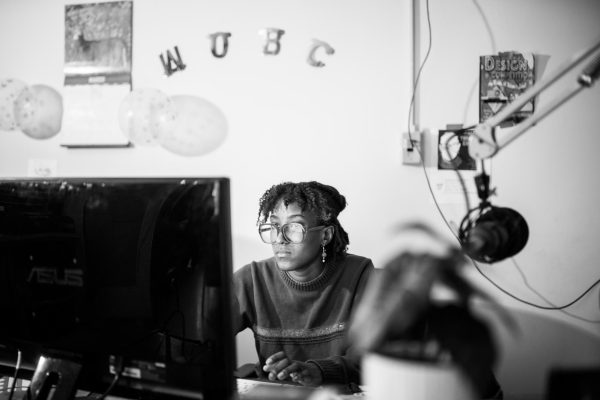Balanced Gender Representation Promotes Better Government
Oberlin continued its dedication to civic participation, political activism, and social justice Tuesday as college students, faculty, and Oberlin residents lined up outside of Wilder 101 to hear executive director of Emerge Vermont Ruth Hardy, OC ’92, speak. The enthusiastic and sweaty audience packed the lecture hall, listening to Hardy discuss why women should run for office and why voters should support them.
Emerge Vermont works “to increase the number of Democratic women in public office.” Hardy is an elected official herself, serving as the chair of the local school board in Middlebury, VT. She got started in local politics because she wanted to introduce foreign language classes to Middlebury elementary schools and fought to implement her vision.
Emerge Vermont finds, recruits, and trains Democratic women to run as candidates for office, providing them with assistance and encouragement throughout their campaigns. As Hardy explained using a plethora of illustrative statistics, graphs, and diagrams, the United States is 101st in the global ranking of representation of women in national legislatures with only 19 percent of relevant positions being held by women — an astounding gender imbalance.
Breaking that number down further, one finds that women comprise 20 percent of the Senate, 19 percent of the House of Representatives, 12 percent of governors, 25 percent of state representatives, and 10 percent of mayors of cities with populations greater than 30,000. By state, Ohio is 33rd in gender parity, and women comprise only 22 percent of the state legislature.
These numbers show the widespread underrepresentation of women in every level of American politics — where men have around four times greater representation than women.
Hardy explained that the significant gender disparity among elected officials is a problem. She said that women, as a result of gendered socialization, are generally better listeners than men and therefore tend to be more collaborative and bipartisan. These qualities are essential in today’s political climate of extreme partisan gridlock. Furthermore, women in legislatures sponsor on average more legislation and bring home more money to their districts through the earmarking process.
Electing women also lends a stronger voice to women’s issues in the political arena. As shown repeatedly in American politics, if women aren’t at the table, exclusively-male groups will make destructive decisions on issues that affect women.
Another benefit of electing more women to office is that, according to Hardy, more equal representation in government increases the overall quality of elected officials. When more people are running for office, voters are able to be more selective. As Hardy said, “You can’t vote for the best candidate if she’s not on the ballot.” Hardy also noted that having more women in office creates greater aspirations for young women, which can only help build a stronger, more representative democracy.
Despite the benefits of having more women in office, women can still be less inclined to run for office than men. Hardy outlined several prominent barriers that tend to discourage women from running. Structural barriers such as the winner-take-all electoral system, the gender pay gap, gerrymandering, campaign finance rules, and partisan polarization are all factors that bar women from breaking into politics. These issues create incumbency advantages, which make changing the gender discrepancies in government much more difficult. There are also situational barriers, including lingering social expectations for domestic responsibility, inflexible careers, and a lack of active recruitment of women by party leadership.
Another barrier, according to Hardy, is that women are less likely to view themselves as qualified to run for office and are faced with unfair double standards in elections. Women often must be both likable and qualified in order to win, whereas it is often acceptable for men to be just one of the two. Sometimes, as Hardy mentioned with respect to the 2016 presidential election, men can be neither likable nor qualified and still be elected.
Hardy and Emerge Vermont’s solution to fix the problem of unequal representation centers around helping and encouraging women to run for office. They do this by guiding women in determining which elected position is the right fit for them, then teach them public-speaking and communication skills, fundraising and networking strategies, and self-care skills.
While most of us focus more on national and state politics, local politics are incredibly impactful on our lives. Local politics decide whether our cities are sustainable, whether those in need in our communities have access to assistance, and whether our cities protect undocumented immigrants, women, members of the LGBTQ community, people of color, and other vulnerable communities. Electing more women to office is an important step in making our societies more safe and equitable for everybody.
Ask yourself which women in your life would be good representatives for Oberlin or your hometown. Are they your friends, your mentors, your mom, your professors? Is it you? Ask these questions because, as Hardy illustrated in typical Obie fashion, one person can change the world.


